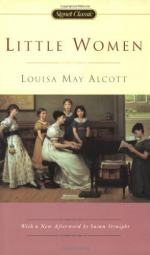“If you mean libel, I’d say so, and not talk about labels, as if Papa was a pickle bottle,” advised Jo, laughing.
“I know what I mean, and you needn’t be statirical about it. It’s proper to use good words, and improve your vocabilary,” returned Amy, with dignity.
“Don’t peck at one another, children. Don’t you wish we had the money Papa lost when we were little, Jo? Dear me! How happy and good we’d be, if we had no worries!” said Meg, who could remember better times.
“You said the other day you thought we were a deal happier than the King children, for they were fighting and fretting all the time, in spite of their money.”
“So I did, Beth. Well, I think we are. For though we do have to work, we make fun of ourselves, and are a pretty jolly set, as Jo would say.”
“Jo does use such slang words!” observed Amy, with a reproving look at the long figure stretched on the rug.
Jo immediately sat up, put her hands in her pockets, and began to whistle.
“Don’t, Jo. It’s so boyish!”
“That’s why I do it.”
“I detest rude, unladylike girls!”
“I hate affected, niminy-piminy chits!”
“Birds in their little nests agree,” sang Beth, the peacemaker, with such a funny face that both sharp voices softened to a laugh, and the “pecking” ended for that time.
“Really, girls, you are both to be blamed,” said Meg, beginning to lecture in her elder-sisterly fashion. “You are old enough to leave off boyish tricks, and to behave better, Josephine. It didn’t matter so much when you were a little girl, but now you are so tall, and turn up your hair, you should remember that you are a young lady.”
“I’m not! And if turning up my hair makes me one, I’ll wear it in two tails till I’m twenty,” cried Jo, pulling off her net, and shaking down a chestnut mane. “I hate to think I’ve got to grow up, and be Miss March, and wear long gowns, and look as prim as a China Aster! It’s bad enough to be a girl, anyway, when I like boy’s games and work and manners! I can’t get over my disappointment in not being a boy. And it’s worse than ever now, for I’m dying to go and fight with Papa. And I can only stay home and knit, like a poky old woman!”
And Jo shook the blue army sock till the needles rattled like castanets, and her ball bounded across the room.
“Poor Jo! It’s too bad, but it can’t be helped. So you must try to be contented with making your name boyish, and playing brother to us girls,” said Beth, stroking the rough head with a hand that all the dish washing and dusting in the world could not make ungentle in its touch.
“As for you, Amy,” continued Meg, “you are altogether too particular and prim. Your airs are funny now, but you’ll grow up an affected little goose, if you don’t take care. I like your nice manners and refined ways of speaking, when you don’t try to be elegant. But your absurd words are as bad as Jo’s slang.”




